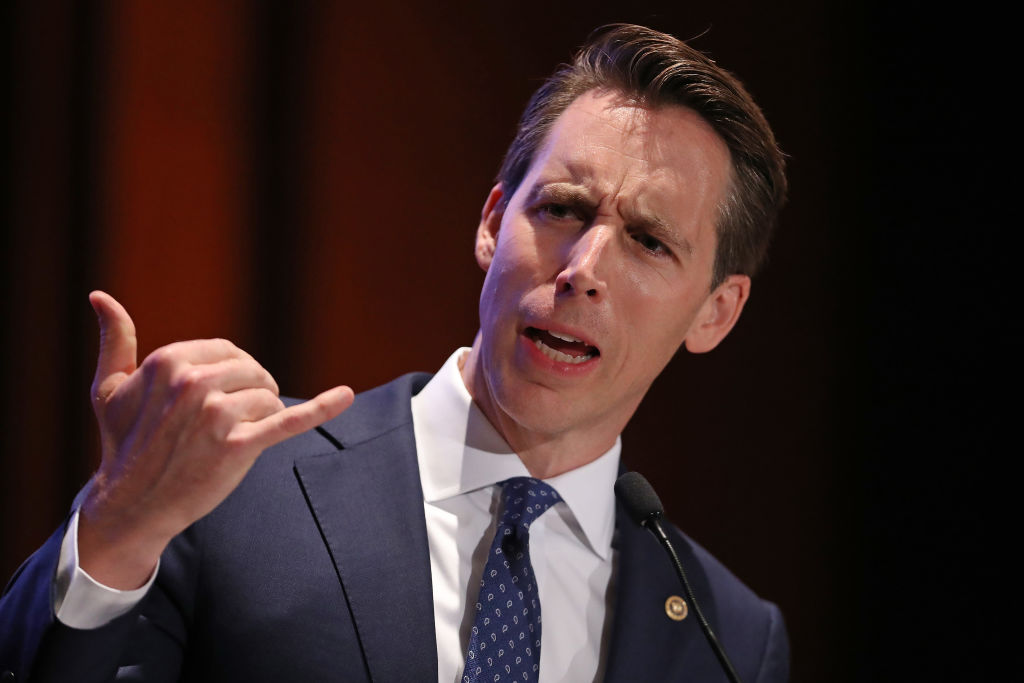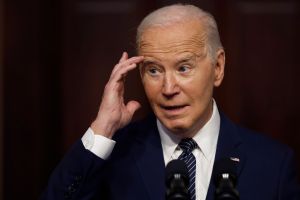‘I met Josh Hawley 10 years ago, and he told me he would be president of the United States,’ a person who knows Missouri’s junior senator tells me. ‘It’s been terrifying to watch him to execute on that pledge perfectly ever since.’
Joshua David Hawley, 39, is the upper chamber’s youngest member. Elected in 2018, a bad year as a whole for the GOP, Hawley would seem to be the Right’s answer to Pete Buttigieg: Xennial, Midwestern, Ivy League, sincerely religious, scary smart.
Like almost everyone who matters on the Right, Hawley addressed this week’s National Conservatism Conference: ‘As we gather tonight, we face a nation divided, a political class paralyzed, the old political programs in shambles, the future uncertain. For we have come again to a time in our national history – one of the great turning points.’
Hawley cut his teeth early in his term by taking on the issue of Big Tech’s suppression of conservative free speech. Silicon Valley censorship was barely on the map three years ago. For years, tech firms, though monolithically liberal, enjoyed a hands-off approach from a libertarian Right ideologically opposed to market intervention.
Thanks in no small part to Hawley, that changed. In June, Hawley introduced the Ending Support for Internet Censorship Act, which would strip tech firms of their Section 230 exemption. Hawley explained: ‘With Section 230, tech companies get a sweetheart deal that no other industry enjoys: complete exemption from traditional publisher liability in exchange for providing a forum free of political censorship…unfortunately, and unsurprisingly, big tech has failed to hold up its end of the bargain.’
Following Hawley’s lead, Ted Cruz this week put the burden of proof on tech companies to produce ‘clear and compelling evidence’ they are not discriminating against conservatives or risk Washington’s wrath. This was a long time coming. According to a new book, ‘Tools and Weapons,’ from Microsoft president Brad Smith, President Barack Obama once told tech execs: ‘I have a suspicion the guns will turn.’
Hawley doesn’t seem content to just turn the guns on tech, however. At Washington’s Ritz on Tuesday night, Hawley laid out what New York Times columnist Ross Douthat called a genuine ‘policy brief,’ not just ‘a blast of resentment’. Douthat notes that Hawley argued for ‘a wage subsidy, a higher ed reform that places schools on the hook for student loans, a prescription drug price control plan’ and he has ‘been the leading GOP critic of monopoly power,’ including tech.
Such an ambitious, national manifesto leaves many with little doubt that Hawley will enter the ranks of Republican presidential candidates the cycle after this one, joining perhaps the flamethrowing Cruz and Tucker Carlson in challenging the careful administration trio of Mike Pence, Mike Pompeo and Nikki Haley in 2024.
Critics complain that Hawley is playing with fire. Hawley on Tuesday night attacked an oblivious, ‘cosmopolitan’ elite. His critique drew condemnation from some quarters – his words were said to be an allusion to a Jewish power elite. Conference organizer Yoram Hazony, an Orthodox Jew, dismissed the charge against Hawley as nonsense. Good for Hazony.
Hawley’s got bigger problems than word choice. Hawley’s address was a microcosm of the conference as a whole. Its organizers and the senator need to work on their foreign policy. Donald Trump as a candidate in 2016 was a contradiction: he occupied both the most hawkish (‘torture works’) and most restrained foreign policy positions on the Right (Iraq was a generation-defining fiasco). Going forward, I suspect even Trump will fail to keep this up.
It’s a time for choosing. Either you’re an Iran hawk, or you want to avoid war. Either you believe in a conservative correction to George W. Bush, or you think US national interest is just whatever John Bolton says it is.
An element of Hawley’s biography some find distressing: he did legal work earlier this decade for the People’s Mujahideen of Iran, more infamously referred to as the MEK. Hawley was successful in wiping the MEK from the State Department’s list of terrorist organizations. The MEK believes itself a Iranian government in waiting. And maybe they are. In my dealings with them, they’re a sophisticated, clever bunch. But others charge they’re effectively a cult, and dangerously disconnected from the reality on the ground in Iran.
Hawley presents himself as a pathbreaking politician. And maybe he is. But in 2016, when running for Missouri Attorney General, Hawley summoned the support of establishmentarians such former Reagan Attorney General Ed Meese and former George W. Bush Attorney General Michael Mukasey, who cheered the technically Marxist MEK as having provided ‘valuable intelligence to the United States about Iran’s nuclear program, and to US troops fighting in Iraq.’
Hawley’s ex-clients in private practice aren’t necessarily his advisers in public office, of course. But he could pour colder water on the association. Hawley already passed on joining some of his edgier colleagues last week – Rand Paul and prominent Reps. Matt Gaetz, Paul Gosar, Jim Jordan and Mark Meadows – in a voting for a resolution that would require Congressional approval before a strike on Iran. The vote was cheered by the conservative Concerned Veterans of American.
A former campaign staffer to Hawley told me the senator sees Sen. Tom Cotton, a frothing Iran hawk, as his guiding light on foreign policy. He should get some new heroes. As Jacob Heilbrunn writes in Friday’s Spectator USA, ‘Entering upon a war would be electoral suicide after Trump ran on the promise to extricate America from the Middle East.’
The Buttigieg comparison aside, Hawley may run one day as a Liz Warren of the Right: a policy wonk, economic populist. But like Warren, he risks an uneven foreign policy. Hawley may not have much interest in foreign policy, but it has an interest in him. After nights like Tuesday, it’d be a shame if Hawley, like Tom Ripley, was not all that he seemed.


















